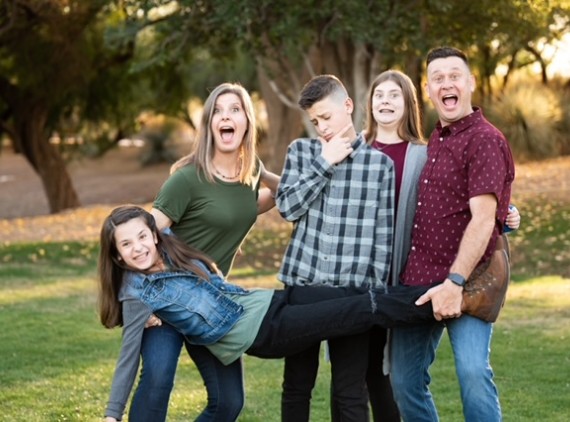Kylah, 11, has faced major health challenges throughout her young life: a brain aneurysm, a brain tumor and epilepsy – and three separate brain surgeries. However, with faith and family on her side, the 11-year-old inspires others with her strength, positive attitude and a whole lot of moxie.
“Kylah is such an overcomer,” said the sixth-grader’s mother, Meghan. “All of her surgeries and ongoing medical challenges have made life difficult for her, but she perseveres with joy and hope. Kylah trusts the Lord through the ups and downs and has a strong faith in Jesus. She is so courageous, and she just keeps trying things and enjoying life!”
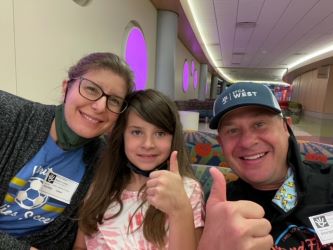
A scary episode
Kylah’s medical journey began when she was just 3 months old. While nursing in her mother’s arms, Kylah suddenly vomited. Next, her eyes rolled back, and she went limp before letting out a “bloodcurdling scream,” Meghan recalled. The episodes repeated in rapid succession before Kylah became unresponsive.
Meghan called 911, and Kylah was taken by ambulance to a local emergency room in Tucson, where the family resides. Doctors ordered a brain CT scan. It revealed a hemorrhagic stroke due to extensive bleeding from a ruptured cerebral aneurysm – a bulging, weakened area in a blood vessel wall.
Kylah was airlifted to Phoenix Children’s and then transferred by ambulance to Saint Joseph’s Hospital in Phoenix to undergo emergency brain surgery. Surgeons performed a type of microsurgery that involves placing a small metal clip on the opening of the aneurysm to prevent further bleeding.
Following the procedure, Kylah was transferred to the Pediatric Intensive Care Unit (PICU) at Phoenix Children’s for further management of her condition by a specialized team, including neurosurgeon David Shafron, MD. Her postoperative recovery was complicated by subclinical seizures. These abnormal electrical impulses were detected by EEG, a test that measures the brain’s electrical activity. Kylah was able to go home after spending about two weeks in the PICU.
Over time, it became evident that the brain bleed had caused permanent weakness on the right side of her body. This limited the full function and dexterity of her right hand and caused some difficulty with her gait due to weakness in her right foot. Later, Kylah underwent surgery at Phoenix Children’s to repair a collapsing joint in her thumb to improve overall function. Kylah remained on seizure medication until age 3. The medication was discontinued after a normal EEG and no further seizures.
“The brain injury caused a massive amount of damage, but she received great care from the nurses and doctors at Phoenix Children’s,” said Meghan. “We were thankful that she made an amazing recovery.”
A genetic link
Brain aneurysms are extremely rare in young children. After extensive genetic testing, Kylah was diagnosed with PTEN hamartoma tumor syndrome (PHTS) caused by a mutation in the phosphatase and tensin homologue (PTEN) gene, a tumor suppressor gene. The condition increases an individual’s risk for tumors, vascular malformations (including cerebral aneurysms) and a host of other conditions.
Doctors at Phoenix Children’s referred the family to a specialist at Cleveland Clinic with significant experience in this rare genetic syndrome. It was there that she first met Neil Friedman, MBChB, a pediatric neurologist with extensive expertise in PHTS and pediatric stroke. Kylah continued to follow-up with Dr. Friedman when he moved to Phoenix Children’s in 2019. Dr. Friedman currently serves as director of the Barrow Neurological Institute at Phoenix Children’s.
Kylah was 3 years old when Dr. Friedman discovered that she had developed an incredibly rare vascular brain tumor. Dr. Shafron performed surgery to remove the tumor. The cancer risk from her PTEN mutation is, unfortunately, lifelong. This requires ongoing surveillance by a team of doctors with expertise and experience in PHTS with regular clinical monitoring and imaging.
An innovative treatment for pediatric epilepsy
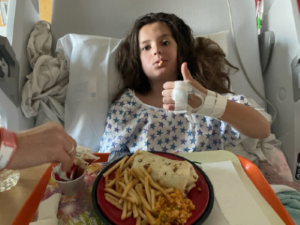
In April 2021, then-8-year-old Kylah and her family – which includes older siblings Callie and Kessler – were camping in Utah when she had a generalized seizure for the first time. It was a frightening experience, especially since Kylah had been seizure-free for many years. Her neurologist, Dr. Friedman, restarted medication to control the seizures.
Stroke is uncommon in children, but an early injury to a blood vessel in the brain increases the risk of epilepsy. After stroke, scar tissue forms as the brain heals. This can serve as a focus for seizures andepilepsy — often years after the initial injury, as was the case with Kylah. Additionally, Kylah’s PHTS genetic condition increased her risk for epilepsy.
“Kylah is a unique young girl in a number of ways,” noted Dr. Friedman. “Not only does she have an uncommon genetic condition, but she has developed remarkably rare complications of this disorder. These include a hemorrhagic stroke from an infantile cerebral aneurysm, a rare vascular brain tumor and an unusual form of epilepsy.
“Kylah’s courage through her challenging journey is an inspiration to us all,” he added. “I feel privileged to be a part of her care team. Her resilience, cheerful disposition and positive attitude reflect the remarkable support and care of her loving and caring family.”
Kylah went on to have several additional breakthrough seizures and ultimately developed a rare form of epilepsy known as epilepsy partialis continua, or EPC. The condition caused a constant twitching in her right hand. Dr. Friedman referred the family to pediatric epilepsy expert, Angus Wilfong, MD, chief of Phoenix Children’s Division of Neurology and associate director of the Barrow Neurological Institute. Dr. Wilfong is a nationally renowned leader in epilepsy. He recommended an innovative treatment using a laser to ablate her seizure source — technology he has helped pioneer in children — to get Kylah’s EPC under control.
Leaders in pediatric epilepsy evaluation and care
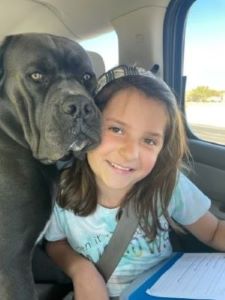
As the only children’s health system in Arizona with a Level 4 designation by the National Association of Epilepsy Centers, Barrow Neurological Institute at Phoenix Children's provides the highest level of medical and surgical evaluation and treatment for epilepsy. In addition, Phoenix Children’s is one of only a handful of centers in the country offering the laser ablation procedure for pediatric epilepsy and brain tumors.
Kylah underwent laser ablation in August 2022. This noninvasive technique uses light to heat and destroy unwanted cells. Using MRI, surgeons targeted the treatment area with pinpoint precision, using a tiny probe inserted into Kylah’s brain through a small incision.
“The surgeons made three tiny incisions in her brain and then sent the laser probe through these entry points,” explained Kylah’s father, Dave. “They positioned the probe perfectly to burn the tiniest area of her brain where they believed all these seizures were coming from.”
Meghan and Dave are pleased with Kylah’s results. Though she still has had some twitching since the procedure, these incidences are now “few and far between,” Meghan explained, adding that the procedure only required an overnight stay in the hospital.
“Kylah is very stable now,” Meghan said. “She’s doing super well, and we couldn’t be happier with the outcome of her surgery.”
Kylah thriving
Despite the challenges she’s faced, Kylah is thriving. A volleyball player on her school’s team, Kylah has developed an unusual serve technique – using just her left hand, instead of both hands – to compensate for the weakness in her right arm. “Most people will throw the ball up underhanded with their right hand, and then hit it with their left,” Kylah explained. “But I’m just using one hand to toss it up, and then boom!”
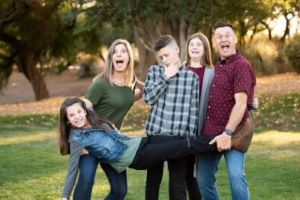
Kylah’s family is grateful for the care they’ve received at Phoenix Children’s. Kylah’s medical team feels like family to them. “We've grown to love Kylah’s doctors and medical team,” Dave said. “You really grow close to these people who are helping save the life of your daughter. They’ve not only provided top-notch medical care, but also really care for Kylah and our family.”
Kylah’s seizure episodes have been scary for the whole family, especially her older sister and brother. Meghan and Dave have tried to keep life as normal as possible, and the family enjoys doing things together, such as camping and playing games. The experience has strengthened their bond and helped their faith grow.
“We really believe the Lord has protected Kylah and blessed us through her situation,” Dave said. “It’s changed the way we all must operate with medications and appointments, but we’re so thankful. Kylah’s just crushing it. She’s doing so well. There’s been lots of tears, lots of praying, lots of hard times and sleepless nights. But it’s brought us closer as a family.”

